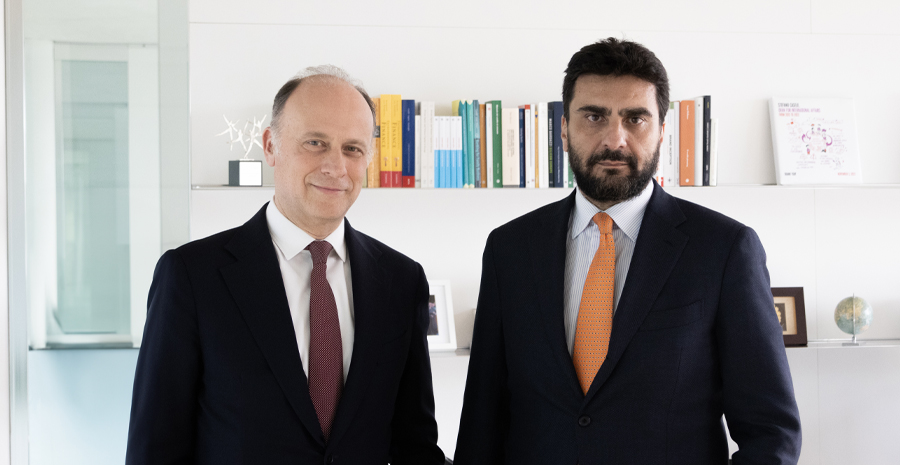
- Start date
- Duration
- Format
- Language
- 2 Dic 2025
- 4,5 days
- Class
- Italian
Far-sightedness, an ability to innovate, a constant search for the very best: this is the perfect blend of leadership. All the more so if it comes from someone who knows a thing or two about leadership and successful blends. We’re talking about Riccardo Illy, Chairman of the Illy Group. In addition to the famous coffee brand name, the group owns brands of excellence in the food sector, such as Domori (chocolate), Dammann Frères (tea), Mastrojanni (prestigious wines), Agrimontana (jams and high-quality confectionary). His story is about value-based Italian entrepreneurship, about a family business that was able to bring taste and the search for excellence to the whole world, overcoming the typical critical issues of generational shifts, and tackling a competitive field populated by giants. But it is also a story about a brilliant political career during which he was mayor of the city of Trieste for two terms (from 1993 to 2001), a Member of Parliament, and then governor of the Friuli-Venezia Giulia (FVG) region (from 2003 to 2008). A one-of-a-kind entrepreneur in politics, who talked about himself and his ideas on strategy to the Full-Time MBA participants during a meeting in the Leadership Series.
Looking towards the future for three generations
Following the footsteps of the family business (Illycaffè was founded in 1933 by his grandfather, Francesco Illy, and inherited by his father, Ernesto, making him the third generation in the business), Riccardo Illy was one of the main players in the company’s expansion. Diversification was a precise strategic choice: “We produced and sold almost world-wide only the best-quality coffee and under one brand name: we wanted to make excellence identifiable. However, we calculated that there were only another 10-20 years of growth in this market, then we would reach the top. What would we leave to the next generation? We had two possibilities: stay in the coffee business by changing our sales strategy, which would mean add other quality levels to widen our market share, or stay in the top-quality segment but expand our range of products. We chose the second option and in 2004 we started diversifying.”
The diversification took place by acquiring top-quality businesses in their respective markets, but avoiding a politic of predominance: “Each company is managed independently and the brands stay separate: those of you who have read Positioning by Ries and Trout are very much aware that it’s difficult to remember a brand name that tries to represent more than one product. Of course, we encourage any possible synergies, especially as regards key accounts, but each company has its own sales organization. This is because the companies have very different sales volumes one from the other, and a single sales network would end up favoring those products with a higher turnover. We know this could mean sub-optimization in the short term, but I think it’s the only way to have smaller businesses grow big enough so as to be able to take them to the stock exchange, which is what I’d like to do.”
Renewal without loss of identity
A constant focus on the long-term, then, but not only that. The key to a company’s financial sustainability is in its ability to innovate and renew itself. And innovation seems to be part of the Illy family’s DNA. Starting from its founder, who in 1935 changed the way to make espresso by inventing a pump-machine that pressurized the water without scorching the coffee blend. Likewise, the introduction of the single-serve container in the 70s (the espresso “pod”) inspired by the paper filter used for American coffee, and matched to a home espresso machine, which would also be sold in the US market a decade later, when Illy USA was founded.
In was in the early 80s that Riccardo Illy, convinced of the fact that their growth prospects were getting more and more international, created the marketing division within the company. An in the global arena the Italian “David” soon faced his “Goliath” in the shape of Nestlè with its Nespresso line. “We had the advantage of already being on the single-serve espresso container market, and we could have become the standard,” remembered Illy. “This is why we founded a consortium and we opened the system inviting all the producers of coffee machines and the most important quality coffee roasters. But the communications campaign didn’t work out due to problems among the consortium partners. The idea of being able to freely choose among different coffee brands for the same espresso machine could have been a winner, but it didn’t reach the consumer strongly enough.”
Illy didn’t give up, and stepped up by raising the bar again: “We did our research and we developed a new type of capsule, the Hyper Espresso, with two main advantages: a special filter which facilitated the emulsion between the water and the coffee’s natural oils to get a richer taste and more body, and a system which allowed the water to go from the capsule to the cup having no contact with the machine itself, giving a higher degree of hygiene and no need for cleaning.” Such strategy—Illy himself admitted—wasn’t enough to challenge Nespresso’s leadership, who in the meantime became market leader with a massive advertising campaign laden with Hollywood stars’ testimonials, and is today the standard for home espresso machines.
“This experience taught us an important thing,” continued Illy. “There is a little-known but frequently observed market dynamic: when a brand name or product gets over the 72% market share threshold, it automatically skyrockets up to 98%. Thus, forging ahead with Hyper Espresso means playing for the remaining 2% against the other competitors: it’s a small niche. What can we do? We won’t take into consideration getting into “pirated” capsules as others have done because that would mean losing our identity. It’s a difficult decision and we’ll have to make it over the next few months.” Clearly, our David hasn’t given up yet.
Sowing so that others may reap.
On the other hand, Riccardo Illy’s political stint seems over, at least for now. But it was too significant not to dedicate it further thought. The request came from Francesco Daveri, MBA Director: how would Riccardo Illy define his political leadership? “Politics mean two things to me,” underlined the former mayor of Trieste and governor of the FVG region. “Firstly you have to put the common interest before the personal one, and long-term objectives before short-term ones. One of my first commitments as mayor was to complete the link between Trieste and the national and international road system: considering the bureaucratic timeframe—6 months just to get the environmental authorization—I knew I would never see the project brought to term while I was mayor. In fact, it took 15 years, but it was necessary to get the process started, in the city’s best interest.”
The mark of a manager can also, and above all, be seen in how he organized the public machine. “The second most important thing in politics is a professional approach. Thinking back to my experience as mayor, I remember that there were some very good managers in city hall, but the organization didn’t work: 36 managing units with no General Manager, each one did its own thing. I had to look for someone to fill that gap and I was lucky, because I found an exceptional person, Andrea Viero (who’s also SDA Bocconi faculty), who became General Manager. No other Italian city had one. Together we carried out two reorganizations of the city administration, reducing the number of managing units down to 12.”
The Italian bet
The meeting couldn’t end without a question about the future of our country. Can we be optimistic? “I’m an entrepreneur, and an entrepreneur is optimistic by nature,” replied Illy. “In Italy we have two great competitive advantages: genius and aesthetics. On one hand, we have the ability to find simple and effective solutions to complex problems. The field of mechanics comes to mind: often certain inventions aren’t even patented, because by the time others manage to copy us, we’ve already moved on. On the other hand, we have a unique sense of beauty and excellence. From this point of view there is only one other country at our level, France, with whom we can collaborate, by the way. Then, if we think that the “wealthy” are increasing world-wide—in China alone there are 200 million, more than in all of Europe—and with them the request of high-level products, something we Italians are great at, it’s hard not to be optimistic, at least from the point of view of the potential that is created. The rest is up to us.”
SDA Bocconi School of Management



This course aims to focus on essential leadership skills that are deemed vital in navigating the dynamic organizational landscape.

